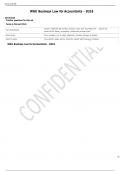9/7/24, 8:20 PM
WGU Business Law for Accountants - D216
Jeremiah
Practice questions for this set
Terms in this set (354)
passed in 1868 after the Civil War, provides, in part, that "[n]o State shall . . . deprive any
14th Amendment
person of life, liberty, or property, without due process of law."
action at law File a complaint, jury or judge, judgement, monetary damages or property
action in equity File a petition, judge, decree, injunction, specific performance, or rescission
WGU Business Law for Accountants - D216
1/6
, 9/7/24, 8:20 PM
A federal or state government agency created by the legislature to perform a specific
administrative agency
function, such as to make and enforce rules pertaining to the environment.
appellant The party who takes an appeal from one court to another.
The party against whom an appeal is taken—that is, the party who opposes setting aside
appellee
or reversing the judgment.
Bill of Rights The first ten amendments to the U.S. Constitution.
binding authority Any source of law that a court must follow when deciding a case.
To violate a law, by an act or an omission, or to break a legal obligation that one owes
breaches
to another person or to society.
Ethics in a business context; a consensus of what constitutes right or wrong behavior in
business ethics the world of business and the application of moral principles to situations that arise in a
business setting.
The rules of law announced in court decisions. Case law interprets statutes, regulations,
case law
constitutional provisions, and other case law.
A concept developed by the philosopher Immanuel Kant as an ethical guideline for
behavior. In deciding whether an action is right or wrong, or desirable or undesirable, a
categorical imperative
person should evaluate the action in terms of what would happen if everybody else in
the same situation, or category, acted the same way.
The system by which each of the three branches of the U.S. national government
checks and balances (executive, legislative, and judicial) exercises checks on the powers of the other
branches.
The branch of law dealing with the definition and enforcement of all private or public
Civil law
rights, as opposed to criminal matters.
The provision in Article I, Section 8, of the U.S. Constitution that gives Congress the
commerce clause
power to regulate interstate commerce.
common law a body of general rules that applied throughout the entire English realm
A test of constitutionality that requires the government to have compelling reasons for
compelling government interest passing any law that restricts fundamental rights, such as free speech, or distinguishes
between people based on a suspect trait.
A court opinion by one or more judges or justices who agree with the majority but want
concurring opinion to make or emphasize a point that was not made or emphasized in the majority's
opinion.
Constitutional law Law that is based on the U.S. Constitution and the constitutions of the various states.
The concept that corporations can and should act ethically and be accountable to
Corporate social responsibility (CSR)
society for their actions.
A decision-making technique that involves weighing the costs of a given action against
cost-benefit analysis
the benefits of the action.
A court that decides controversies and administers justice according to the rules,
courts of equity
principles, and precedents of equity.
A court in which the only remedies that can be granted are things of value, such as
courts of law money damages. In the early English king's courts, courts of law were distinct from
courts of equity.
The branch of law that defines and punishes wrongful actions committed against the
Criminal law
public.
An informal term used to refer to all laws governing electronic communications and
cyberlaw
WGU Business Law for Accountants - D216particularly those conducted via the Internet.
transactions,
2/6




